|
|
|
Sort Order |
|
|
|
Items / Page
|
|
|
|
|
|
|
| Srl | Item |
| 1 |
ID:
167419
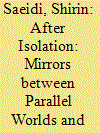

|
|
|
|
|
| Summary/Abstract |
In this article, we theoretically conceptualise the renegotiation of participatory action and activism through the formation of intellectual space that is self-reflective and upheld by what we metaphorically describe as mirrors between parallel worlds. Rethinking what activism is and how an individual relates to their social group is dependent on different levels of self-reflection, self-criticism and competing scales of insertion of other people’s struggles into one’s own political vision in an effort to intellectually rectify the local tensions that emerge in a post-revolutionary context where people are disconnected from global-level activism. A significant aspect of this analysis is our interlocutors’ imaginative capacity to draw from other people’s experiences through cultural and visual artefacts and integrate them into their own life history with the intention to address national or group-specific dilemmas. While some have drawn attention to the importance of noting how spaces for activism are remade in the post-revolutionary context due to such sentiments as disappointment, we instead examine the formation of conceptual spaces of activism within the context of isolation in contemporary Iran. Empirically, we bring together a political analysis of the novel Bevatan by Reza AmirKhani, and interviews conducted with English literature students in Shiraz.
|
|
|
|
|
|
|
|
|
|
|
|
|
|
|
|
| 2 |
ID:
167417


|
|
|
|
|
| Summary/Abstract |
This article analyses climate change activism through the framework of agonism. It discusses dominant political theories of climate change and then contrasts those with agonism. Next, it proceeds to analyse the logic of resistance in climate change activism, focusing on the 2017 People’s Climate March (PCM17) to understand how it articulated both its conceptions of the political and of climate change. This article argues that, in articulating its logic of resistance, the PCM17 served to depoliticise climate change by embracing a consensus-based conception of the political and a singular conception of climate change. The PCM17’s claim of resistance therefore constrained dissent and was ultimately counterproductive to a vibrant politics of climate change. Rather than understanding climate change as singular, I argue that reconsidering climate change as multiple – that is, as an unstable, contested representation of multiple political ecologies – provides the political space necessary to accommodate dissent in debate about climate change without abdicating the responsibility to acknowledge its existence as a political problem. An agonistic framework of climate change politics severs the tie between the political and consensus, allowing a radical democratic politics of climate change to adopt a robust logic of resistance in climate change activism.
|
|
|
|
|
|
|
|
|
|
|
|
|
|
|
|
| 3 |
ID:
167415
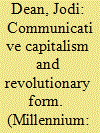

|
|
|
|
|
| Summary/Abstract |
This essay considers the political form that is presupposed in questions of resistance and revolution. It situates resistance and revolution in communicative capitalism, a setting characterised by intense winner-take-all inequality, the decline of symbolic efficiency, and the shift from the use to the circulation value of communicative utterances. It draws out the way that this setting inflects the body the question of resistance and revolution presupposes. Is it the world, the individual, the network, or the party? I argue that the party is the form we need to assume when we ask about revolution because it is the party that has the capacity to strategise, to plan and to arrange itself with an eye to revolution.
|
|
|
|
|
|
|
|
|
|
|
|
|
|
|
|
| 4 |
ID:
167420
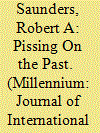

|
|
|
|
|
| Summary/Abstract |
When and where one can urinate is increasingly politicised around the globe. As an example of bio-political power, the provision, regulation and access to public toilets reflects larger structures in any given society. However, there is another side to micturition, that is the use of urine as a manifestation of bodily power over another/others. This article analyses the politics of the urinal through a close reading of the men’s toilet in The Lismore pub in Partick, Scotland, thus bringing together these two threads via the concept of everyday effigial resistance. In our interrogation of a politicised urinal that asks users to ‘piss’ on historical figures associated with the Highland Clearances, we aim to push International Relations to follow Enloe’s call for the study of ‘mundane practices… and the most intimate spaces’ by considering the most banal aspects of the human condition as part of its remit. Our case study serves as an explicit political intervention, one which through its geographic and geopolitical scales makes an argument for engaging with the mundane, vernacular and vulgar in everyday IR.
|
|
|
|
|
|
|
|
|
|
|
|
|
|
|
|
| 5 |
ID:
167423
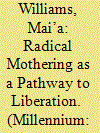

|
|
|
|
|
| Summary/Abstract |
I weave several threads in this essay, including the history of obstetrics and traditional Black midwifery, the devastating statistics of Black infant and maternal mortality rates, the experiences of eastern Congolese mama activists, the written and lived testimonies of Black North American mama activists, and my personal narratives to illustrate that the practice of mothering is fundamental to creating co-liberatory revolutionary movements and societies. This essay shows how mama activists, in particular Black mama activists, are taking great risks to their lives in the face of white patriarchal structures and in the midst of the ‘afterlife of slavery’ in order to honour the fallen and create a more just future. It also questions scholar-activists as to how they, whose scholarship is built off of the work of these mama activists, redistribute the life and death risk that mama activists shoulder to create the just world scholar-activists claim to desire.
|
|
|
|
|
|
|
|
|
|
|
|
|
|
|
|
| 6 |
ID:
167422
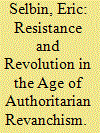

|
|
|
|
|
| Summary/Abstract |
We live in an age of authoritarian revanchism, an era of Austerity-Security States often voted in by a set of fears stoked by elites that economies require patriarchal, conserving policies. Hence the end of state welfare functions, destruction of stable employment and unclear job futures create profound economic fear even as the destruction of communal bonds such as identities, social protections and sense of place have produced deep social dread. Resistance, rebellion and revolution remain ready and apt responses for people all around the world. Recent academic interest in ‘imaginaries’ – social, cultural, technological, psychological and more – reflect a renewed appreciation for human agency, collective action, ideology, cultural matters and the ‘narrative turn’. Rich revolutionary imaginaries, often daring acts of bricolage, provide people with the means and methods to struggle for control of the material and ideological conditions of their everyday lives even in the face of forces inimical to their interests. What could be more meaningful than changing the small worlds that are our everyday worlds and hence matter most for most of us most of the time? Where, when, and who will bring revolution into the 21st Century? A broader, deeper definition will help to ascertain, explore and explicate.
|
|
|
|
|
|
|
|
|
|
|
|
|
|
|
|
| 7 |
ID:
167414


|
|
|
| 8 |
ID:
167418


|
|
|
|
|
| Summary/Abstract |
Critics of contemporary liberalism question whether the expansion of human and social rights can deliver radical social change. Drawing on ethnographic research in São Paulo, this article challenges this view by analysing how the discourse of rights has been critically redeployed by a radical Homeless Workers’ Movement – the Brazilian Movimento dos Trabalhadores sem Teto (MTST). The MTST’s strategic use of a discursive framework of social rights problematises existing scholarship which fails to account for the ways in which activists rework and redeploy ideas of rights in practice. In particular, the article demonstrates the centrality of rights discourse to the formation of radical political subjectivities and the emancipatory goals pursued by the MTST. This counter-hegemonic politics of rights re-signifies liberal discourse, exceeding its conventional juridical boundaries: it creates politicisation in occupations, and it constitutes a strategy of counter-conducts vis-à-vis neoliberal governmentality.
|
|
|
|
|
|
|
|
|
|
|
|
|
|
|
|
| 9 |
ID:
167416


|
|
|
|
|
| Summary/Abstract |
Joining the discussion of revolution and resistance in world politics, this article puts forward the idea of poetic revolt as a necessary companion to these terms, one which centres attention on the ongoing reverberations of transatlantic slavery – what have been called its ‘afterlives’ (Saidiya Hartman, Édouard Glissant). Engaging with contributions to poetics, black studies and black feminist thought, it first develops a theoretical orientation of the ongoingness of slavery as a ‘grammar of captivity’ (Hortense Spillers) that ‘wake work’, a term proposed by Christina Sharpe, aims to disrupt. The article calls for methodological attention to the fugitive and wayward arts and acts of living, that is, what Sylvia Wynter and Fred Moten call the ‘sociopoetic’ practices of enslaved and legally-emancipated populations to illuminate the simultaneity and entanglement of structuring violence and poetic revolt. Second, drawing on Spillers’ scholarship on homiletics – the study of and participation in sermons – in particular United States contexts, it identifies and discusses three aspects of poetic revolt: ‘fabulation’, world-making otherwise and resignification, through which such communities developed a critical and insurgent posture aimed at rupturing this grammar of captivity and at forging critical, futurally-oriented sociabilities. Third, in conclusion, it discusses the links of poetic revolt, in its specificity in Atlantic slavery, to wider systemic critique. Pluralising our thinking on revolution and resistance, poetic revolt, it argues, is best seen as a critical meditation on futurity.
|
|
|
|
|
|
|
|
|
|
|
|
|
|
|
|
| 10 |
ID:
167421


|
|
|
|
|
| Summary/Abstract |
I consider prospects for revolution in the 21st century, defined here as a thorough-going world revolution that replaces the capitalist world-system with a feminist-inflected democratic socialism. An overview of 20th century revolutions and more recent uprisings suggests distinctive contemporary features, including women’s participation and the diffusion of feminist agendas, but also constraints. In the face of reactionary social movements, and given the limits of ‘horizontalist’ politics, activists could learn from past revolutionary strategies to build a powerful global alliance of progressive forces.
|
|
|
|
|
|
|
|
|
|
|
|
|
|
|
|
|
|
|
|
|